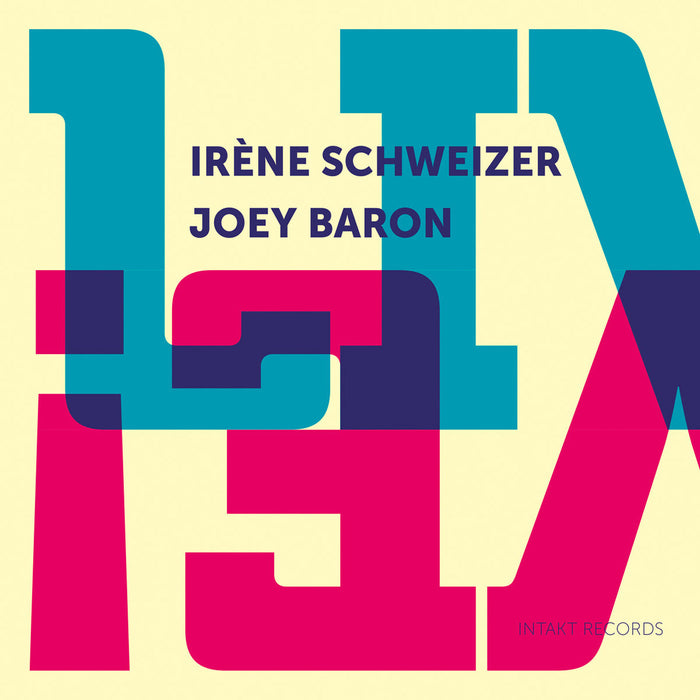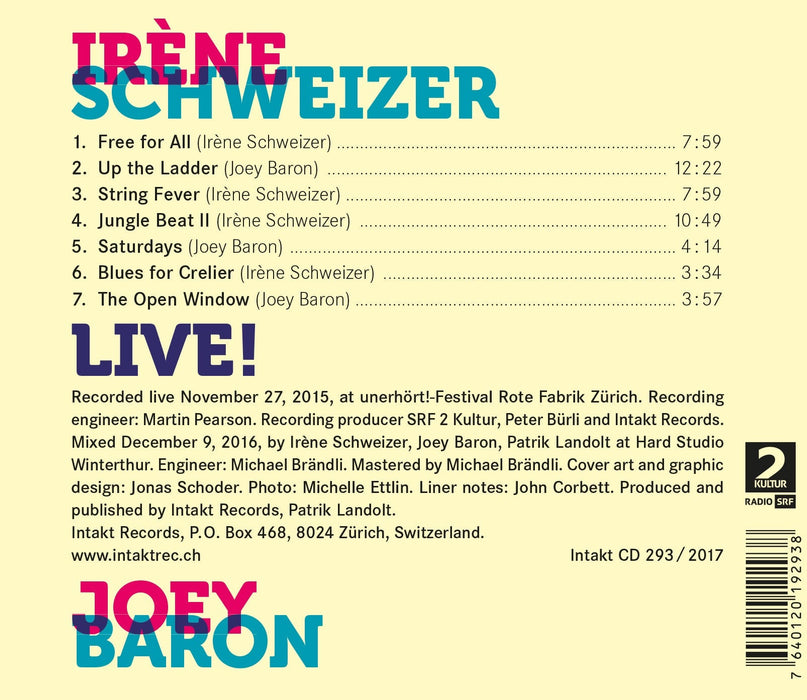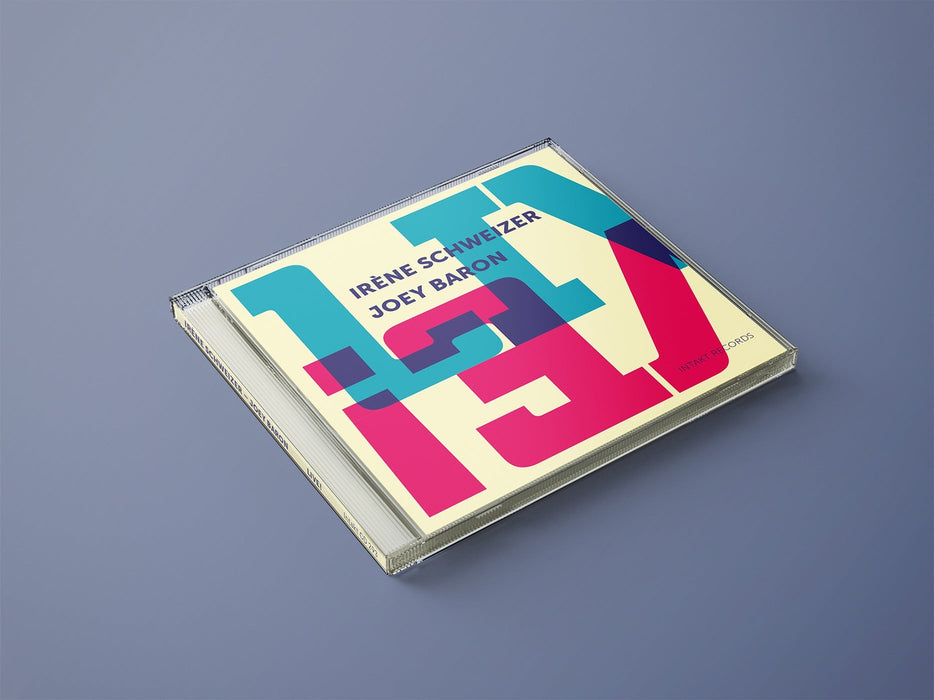


293: IRENE SCHWEIZER – JOEY BARON. Live!
Intakt Recording #293/ 2017
Irène Schweizer: Piano
Joey Baron: Drums
Recorded live November 27, 2015, at unerhört!-Festival Rote Fabrik Zürich.
More Info
A meeting of two jazz giants: In 2015, Joey Baron, one of the most sought after drummers on the New York scene met the First Lady of european jazz, swiss pianist Irène schweizer, in concert in Zürich. during his long career Baron has played with bands such as Naked city and Masada and worked with musicians dizzy Gillespie, chet Baker, Joe Lovano, Bill Frisell and Marc Ribot.
Schweizer had already performed and recorded with the best drummers on the planet: Pierre Favre, Han Bennink, Louis Moholo-Moholo, Günter “Baby“ sommer, andrew cyrille and Hamid drake.
The performance of the two was one of the highlights of the Unerhört-Festival in Zürich, 2015. their encounter had everything you could hope for: energy, drive and mesmerizing exchanges paired with the magical tunes schweizer is famous for. “this beautiful recording documents a marvellous evening in Zürich,“ John corbett writes in the liner notes.
Album Credits
Cover art: Christine Reifenberger
Graphic design: Jonas Schoder
Liner notes: Christian Broecking
Photo: Peter Gannushkin
Recorded at Brooklyn recording in NYC by Andy Taub on January 19th, 2017. mixed by Andy Taub on January 26th, 2017. mastered by Alan Silverman at Arf! Productions Inc. on May 3rd, 2017. Executive Production by Anja Illmaier. Produced by Tom Rainey and Intakt records.
Klug ausgewählt und montiert
Als die Zürcher Jazzerin Irène Schweizer vor zwei Jahren ihren 75. Geburtstag feierte, würdigte Christian Broecking sie mit einer Biografie. Doch der bekannte Berliner Jazzpublizist enttäuschte mit einem ausladenden, schlecht redigierten 500-Seiten-Wälzer Wiederholungen.
2018 kann Irène Schweizer voller erneut feiern: Im Frühling bekam sie den Kulturpreis des Kantons Zürich, dieser Tage den Grand Prix Musik des Bundesamts für Kultur. Wieder gibt es eine Würdigung. Doch wie viel eleganter als Broecking geht Annina Salis ans Werk. Ihre «Passage>> auf SRF 2 Kultur ist ein persönliches, liebevolles und doch hinterfragendes Porträt. Salis konzentriert sich auf klug ausgewählte, wesentliche Aspekte in Schweizers Leben und Wirken. Nebst der künstlerischen Entwicklung spricht sie die kultur- und sozialpolitischen Engagements an oder den humorvollen Genussmenschen. Dabei nutzt Salis die radiofonen Möglichkeiten und überzeugt mit einer schlüssigen Collage aus Musik, Zitaten und aufschlussreichen Kommentaren. In einer dichten, aber doch leichtfüssig erscheinenden Stunde wird sie der reichhaltigen Biografie der Jazzerin gerecht. Annina Salis, selbst auch Musikerin, hat den richtigen Ton und die richtige Form gefunden.
On connaît peu de pianistes qui pratiquent “l’art du duo” en compagnie d’un batteur en une telle communion. Irène Schweizer, qui illustre magistralement cet art depuis fort longtemps, poursuit ici une magistrale série de duos piano-batterie pour Intakt entamée en 1986 avec Louis Moholo, et continuée avec Günter Sommer, Andrew Cyrille, Pierre Favre (par trois fois) et Han Bennink (par deux fois), que des maîtres ! (cf. Culturejazz « C’était en 2013 : 2e séance de rattrapage » 14/01/2014 ; « Les disques qui vous ont échappé (2) » 31/01/2016). Lors d’un concert à Zürich en novembre 2015, c’est avec le batteur américain Joey Baron qu’elle croisa le fer. Sept compositions de l’une et de l’autre (dont une démarquée de Dollar Brand) sont au programme. Au travers d’une grande variété de rythmes et de climats, on constate le sens aigu de la construction rythmique, y compris lors de passages assez minimalistes ou à la dimension plus spatiale. Notons que Baron, connu pour sa poigne, ne se montre pas du tout envahissant et déploie un jeu d’une grande musicalité.
https://www.culturejazz.fr/spip.php?article3360
Die Schaffhauser Jazzpianistin Irène Schweizer konnte am Donnerstag im Theater Gessnerallee den Kulturpreis des Kantons Zürich entgegennehmen.
Die Schweizer Jazzlegende Irène Schweizer ist nicht nur Trägerin des diesjährigen Schweizer Musikpreises, sondern auch der höchsten Auszeichnung, die der Kanton Zürich im Bereich Kultur zu vergeben hat. Dass der vom Zürcher Regierungsrat verliehene und mit 50000 Franken dotierte Kulturpreis des Kantons Zürich 2018 an sie geht, war im Januar bekannt geworden. Die Preisverleihung am Donnerstag fand unweit von Schweizers langjährigem Wohnort in der Stadt Zürich statt, im Theater Gessnerallee.
Den eindrücklichen Weg vom klavierspielenden «Fräulein Schweizer» aus Schaffhausen zur Ikone des europäischen Free Jazz zeichneten Regierungsrätin Jacqueline Fehr und Patrick Landolt, Verleger von Intakt Records und Wegbegleiter, nach.
Als Frau in der Männerdomäne des Jazz, als Vorkämpferin für Feminismus und als Antiapartheidkämpferin der ersten Stunde schilderte Fehr die 77-Jäh- rige. In ihrem Freiheitsdurst sei Schweizer eine Pionierin und Mutmacherin für so viele geworden. «Vor ihrer Eigenständigkeit ziehe ich den Hut», sagte Fehr. Als jene Musikerin, welche «das europäische Klavier afrikanisiert>>> habe, würdigte Landolt die Jazzerin.
Schweizer bedankte sich für die Laudationes mit den Worten: «So viel Lob auf einmal macht mir ja fast Angst.» Sie sagte, es sei ein bewusster Entscheid gewesen, dass sie heute nicht selbst in die Tasten greife. Stattdessen spielte das rein weibliche Trio der Basler Saxo- fonistin Sarah Chaksad, die unter anderem als Kuratorin der Schaffhauser Jazzgespräche bekannt ist. So wurde die Flamme des weiblichen Jazz an eine jüngere Generation weitergereicht.
Zum Festakt gekommen waren neben Grössen aus der Schweizer Jazzszene auch eine Delegation aus Schweizers Heimatstadt, angeführt von Stadtpräsident Peter Neukomm, Kulturreferent Raphaël Rohner und Jazzfestival-Chef Urs Röllin. Angesichts von so viel Präsenz aus der Munotstadt bemerkte die Zürcher Regierungsrätin Jacqueline Fehr lakonisch: «Also, sie gehört schon auch ein wenig uns!»
Auch die Zürcher Stadtpräsidentin Corine Mauch und alt Bundesrat Moritz Leuenberger erwiesen der «Grand Old Lady>> des Schweizer Jazz die Ehre.
Unbändige Freiheit
Es ist der bislang krönende Abschluss ihres Lebenswerkes. Die 38. CD, die das von Irène Schweizer mitgegründete Intakt-Label unter ihrem Namen veröffentlicht, dokumentiert, was der bedeutendsten Pianistin der europäischen Jazzgeschichte schon immer am wichtigsten war: das Live-Konzert. Joey Baron, einer der meistgefragte Schlagzeuger der amerikanischen Szene, komplettiert hier mit Schweizer eine Duo-Reihe, die sie über Jahrzehnte aufgenommen hat, mit Pierre Favre, Andrew Cyrille, Han Bennink und weiteren großen Schlagzeugern des Jazz. Schweizer, die selbst auch Schlagzeug spielt, hat ihr Klavierspiel immer als perkussiv bezeichnet. Auch das eine Spezialität von Schweizer und ihrer kongenialen musikalischen Partner: Vor dieser Aufnahme beim Zürcher Unerhört!-Festival gab es kaum Absprachen, Notenständer mag die Pianistin sowieso nicht. Von ihren Klassikern sind hier „Free For All" und „Jungle Beat 2" in hinreißenden Improvisationen zu hören. Am 31. Mai wird Irène Schweizer mit dem Zürcher Kulturpreis in Höhe von 50 000 Schweizer Franken ausgezeichnet, und am 13. September erhält die 1941 in Schaffhausen geborene Autodidaktin den Grand Prix Musik 2018, den mit 100 000 Schweizer Franken höchstdotierten Preis der Schweiz. Mit dem Preis- geld will sie nun die englische Buchausgabe ihrer Biografie,,„Dieses unbändige Gefühl der Freiheit" auf den Weg bringen.
Lorsqu’une artiste est friande de duos comme l’est Irène Schweizer, il est aisé de jouer au jeu des comparaisons. Depuis des années, le label Intakt Records offre à la pianiste des plages de liberté en face-à-face ; là où on se livre totalement et où l’intimité est double : avec son instrument, évidemment, et avec l’altérité amenée par l’autre improvisateur. Il s’agit souvent d’un moment intime, et cela permet de voyager loin en s’appuyant sur des voies déjà construites, comme dans le cas des multiples rencontres avec Pierre Favre ou Louis Moholo. Ou c’est un ancien compagnon que l’on retrouve après des décennies et qui propose de défricher des sentiers délaissés, comme le laissait entendre Welcome Back aux côtés de Han Bennink.
Parfois les relations sont neuves, inédites, et marquées d’une certaine évidence. Ainsi de ce concert enregistré en novembre 2015 à Zürich avec Joey Baron. Le fait que l’américain soit batteur ne change rien, même si le jeu percussif et nerveux de la Suissesse a toujours magnifié ses partenaires percussionnistes. L’orgie pulsatile de « Jungle Beat II », pièce centrale dont la tension semble soutenir l’ensemble, en témoigne. La main gauche ferme, directive mais pas autoritaire, s’accommode des syncopes de Baron. Si Schweizer a l’habitude des percussionnistes qui affectionnent le détail, la sonorité, l’enluminure, comme on peut le constater sur le disque avec Bennink sorti il y a quelques mois, elle est ici face à un set de batterie plus classique où la peau domine et les cymbales ne servent principalement qu’au relief. Le rapport de forces en est forcément modifié, et le « Blues for Crellier » revient au format court qui revendique sa joie de jouer du jazz, d’affirmer le rôle rythmicien du clavier et d’asticoter son partenaire avec malice (« The Open Window »).
Live ! n’est pas qu’un cri du cœur, une affirmation de l’immédiateté. Il y a un véritable plaisir à mesurer l’euphorie de ces deux légendes à l’idée de se confronter. Pas de round d’observation : « Free For All » donne le ton sans attendre dans un ostinato main droite habillé d’une salve de métal. Le style est différent, plus féroce qu’avec ses percussionnistes habituels, et proche de son ancien round avec Andrew Cyrille, mais la poésie de « Up The Ladder » - vraisemblablement le sommet de l’album - rappelle à quel point ces deux artistes sont des esthètes qui aiment se laisser le temps pour se souvenir de leurs attaches plus classiques. Une brillante pièce supplémentaire de la discographie sans faille de ces délicieux esprits frappeurs.
https://www.citizenjazz.com/Irene-Schweizer-Joey-Baron.html
Erstaunlich, dass es bedeutende Schlagzeuger gibt, mit denen Irène Schweizer noch nicht gespielt hat. Im Herbst 2015 traf die damals 74-jährige Zürcher Pianistin, die das Piano-Drum-Duo seit Jahrzehnten prägt, erstmals auf Joey Baron, Doyen der New Yorker Szene. Zwischen den beiden funkte es sogleich, sie feierten ein Konzert voller Frische, Freiheit, Frechheit und zelebrierten die hohe Kunst des Impro-Duos. Nun liegt der Live-Mitschnitt vor.
The veteran Swiss free-jazz pianist has made her reputation, in part, working in the unloved duo format with drummers like Han Bennink and Andrew Cyrille. On her latest, a live date in Zurich, she conspires with none other than Joey Baron. Her percussive attack, informed as much by pre-War stylings than of Cecil Taylor, artfully maneuvers around Baron, and she’s unafraid to clash toe-to-toe with him.
https://www.villagevoice.com/2017-the-year-in-jazz/
Sono passati trentuno anni da quando la favolosa pianista svizzera Irène Schweizer iniziò a documentare per l’etichetta svizzera Intakt i suoi duetti con batteristi. Spesso ripetuti nel corso degli anni. Iniziò con Louis Moholo, principe libero della poliritmie sudafricane, proseguì con Günter “Baby” Sommer, Andrew Cyrille, Pierre Favre, Han Bennink. Dunque bel bilanciamento tra protagonisti delle note afroamericane ed esponenti della stessa famiglia di note europei, spesso suoi compagni d’avventura in territori dove la musica si liberò da molte pastoie formali, negli anni Sessanta e Settanta dello scorso secolo. Adesso Schweizer torna a guardare all’America, e incrocia le energie con Joey Baron, una delle menti più brillanti ed efficaci emerse nel campo delle percussioni negli ultimi decenni: batterista capace di suonare con gesto dinoccolato e aperto, salvo poi saper tornare in una frazione di secondo a groove micidiali ed implacabili.
Non ingannino gli aspetti, né le parole sembrino offensive: Schweizer oggi ha l’aspetto rassicurante da nonna buona, Baron sembra il proprietario di un emporio in Texas. Assieme, invece, sono pura intelligenza jazzistica in azione, mercuriale e imprevedibile a dispetto di ogni anagrafe possibile o reale. Che dichiara settantasei anni per lei, sessantadue per lui. Si sono trovati sul palco di un Festival il 27 novembre del 2015, a Zurigo, e questo cd è cronaca fedele e impressionante della potenza sprigionata dall’incontro. Nell’iniziale “Free For All” al terzo minuto Schweizer si inventa un pedale su una nota sola che lancia un memorabile canto in odore di blues e di gospel, in “Saturdays”, a firma di Baron, vince una linea melodica di bellezza scultorea, in “String Fever” la cordiera del piano è percussione aggiunta a quelle di Baron. Certi incontri lasciano il segno. Questo resterà.
Joining an illustrious cast of percussion partners who have played in duo with Swiss pianist Irène Schweizer is American Joey Baron. No place for the faint of heart, Schweizer’s playing partners have ranged from Günter Baby Sommer to Andrew Cyrille. But considering that Baron’s background includes stints with everyone from Carmen McRae to John Zorn, he gives as much as he gets.
Curiously enough for two figures closely identified with so-called avant-garde Jazz, there are times when their connection reaches such a peak of unfettered swing that you could be listening to an Earl Hines-Jo Jones date or even Peter Johnson with a Blues drummer. Those sort of playful, allusions appears as early as “Free for All”, the first track, which is also contemporary enough to have that honky-tonk train move along on an imaginary track that is stretched and stretched almost to infinity without breaking. “Blues for Crelier” is the other obvious showcase, with enough flashy stops and beaks to give both players space. Elsewhere Baron further demonstrates his understated percussion mastery, with interjections that sound as if he’s bending the cymbals while dislocating the time and beat, often in tandem with the pianist. For her part Schweizer creates a harpsichord-like plinking on “String Fever”, and then reverses herself immediately afterwards and figuratively dives into the piano innards for low-pitched resonations.
Oddly enough though, despite the pianist’s stated background rooted somewhat in South African jive, and Baron’s long-time movement through cooler sound and some updated-Klezmer, the melodies that insinuate themselves most in these performances are those of Thelonious Monk. Rather than using his tunes as a fashionable aroma to perfume otherwise unaffiliated performances as some players do, Schweizer and Baron’s Monk allusions are used sparingly, plus arrive and exit logically, “Up the Ladder” for instance, which chugs along with drum pops and rolls, finds the pianist alternating among relaxed single fingering, expressive glissandi or exploring subterranean soundboard bursts with. When a quote from a Monk tune slips into the narrative, it does so logically and it vanishes as quickly as it appears. Additionally “Jungle Beat II” throws references to “Well You Needn’t” into the mix, pulls back for a texture-spanning four-limbs-at-once solo from Baron and ends the piece with the same simple swing that characterize “Up the Ladder”. Live is yet another reminder that Baron can swing with the best of them when he puts his mind to it. Obviously the cause of the drummer rising to the occasion, the disc also offers more of Schweizer’s still evolving playing and composing expertise.
https://www.jazzword.com/reviews/irene-schweizer-joey-baron/
Pianist Irène Schweizer has a lustrous and historically deep approach to the piano, informed by her early study of boogie-woogie and stride, and fleshed out through the exploration of other traditions: Romanticism, Impressionism, bebop and free improvisation. They've all informed her way of playing in duo configurations with drummers, which she's done alongside Han Bennink, Louis Moholo Moholo, Pierre Favre and Andrew Cyrille.
Live!, her first album with the illustrious drummer Joey Baron, collects seven freely roaming tunes and there's not a dull moment. On "String Fever," Schweizer plays inside the piano, clacking the instrument's frame and dampening strings as she plucks them; Baron responds with thick clouds, drawn by strokes along the edges of his cymbals. On "Saturdays," he uses mallets against the toms to similar effect. This time Schweizer follows him, letting the light of her minor harmonies and suspended chords become subsumed under the shadow of his drums.
Abdullah Ibrahim's influence flickers up at various points, particularly when Schweizer plays loping cycles of major chords or, as on "Blues For Crelier," warm little phrases of traveling two-note harmony in the right hand. Other times, as on "Jungle Beats II," it's Cecil Taylor who looms as Schweizer lets some of her natural cogency spread out and wander. Like Taylor, she can achieve a remarkable independence between her left and right hands in the course of a free improvisation, each projecting a crisp and full-bodied sound, full of rich and bluesy ardor.










